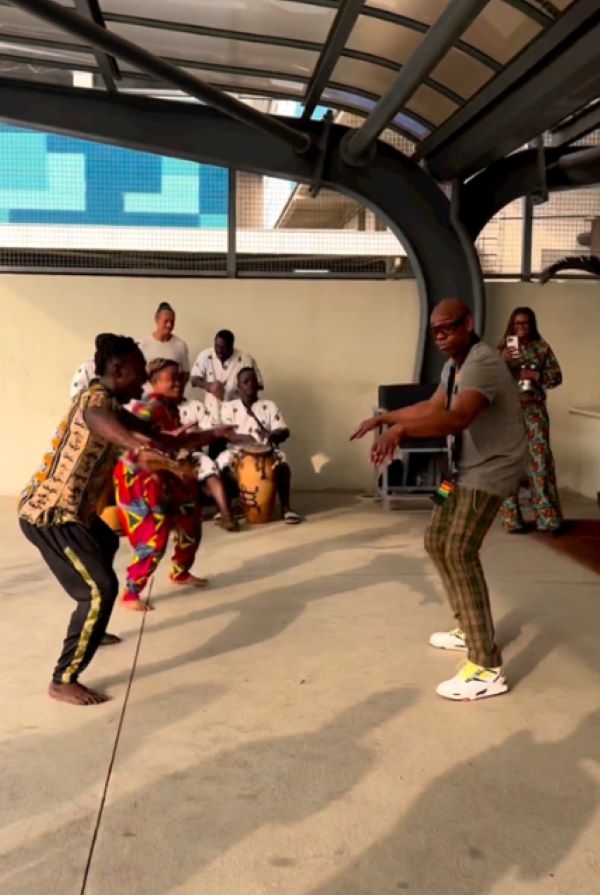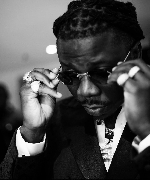GTA explains why Africans of the diaspora are received with pomp and pageantry
 Comic star Dave Chappelle received with dance and music by the Ghana Tourism Authority at the Kotoka International Airport (KIA), Accra
Comic star Dave Chappelle received with dance and music by the Ghana Tourism Authority at the Kotoka International Airport (KIA), Accra
The Ghana Tourism Authority has noted its profound appreciation for local creatives, giving reasons, also, for why comparatively, it reserves grand celebrations for Africans of the diaspora.
The Deputy CEO of the GTA, Benjamin Anane-Nsiah and the Social Media Manager, Beyond the Return Office, GTA, Ivy Prosper, spoke to Prince Benjamin (PB) on the Class Morning Show on Class 91.3 FM.
Ms Prosper argued receiving Africans of the diaspora with music, dance, and kente, among other things, “is not a slighting of the locals” but an effort to give estranged precious family members of the African community a befitting welcome, the stark opposite of what is otherwise inaccurately expected by them, in her opinion, because of the propaganda of the media.
“I think what we have to understand is, imagine you come from somewhere that you never knew where you originally came from. Imagine your ancestors were taken away from the continent and for hundreds of years, generation after generation, your family had no idea where you came from, no idea about any culture, nothing at all. You don't know this place and you're afraid to come to this place. They have this fear about Africa because the media has made Africa look like it's a terrible place, ‘It's scary to go, the people don't like you’. People tell them, ‘Africans don't like you’. So some of them are afraid when they're coming, wondering, ‘Are they going to actually receive me well?’ And so some of them actually feel like that welcome is a way to initiate you coming back into a family that you never knew. And these people are actually saying, ‘We love you and we want you to come home and be a part of us’. So for them, it's a completely different dynamic than for a Ghanaian who was born and raised here. They know who their grandmother is. They know where their great grandmother came from. They're like, ‘I know my hometown is here. I know my mother's from there. My father's from there. My great, great, great grandmother's from this tribe’. We know, we have that already. You can go to a funeral and you'll see a cultural troupe. You can go to someone's wedding and they may have some Adowa dancers. It's normal for you. So for them [Africa diaspora], it's a completely different experience. And to make the comparison, I don't think it's fair.”
To buttress, Mr Ben Anane-Nsiah recognised locals, especially creative industry players, as cherished partners in a cause to market the country to the diaspora.
He said: “I think I nailed it. But you know, like she rightly said, it's not a slighting of the locals. The tourism and creative arts space, we actually move together, in tandem. And we use them [artistes] all the time. They are, what do you call them? You know, they are the people who drive what we do, our ambassadors and all of that; the output of their creativity, their contribution, giving Ghana its unique cultural identity. So they are very important in the scheme of things.”
He called to mind the prodigal son of the Bible, his ultimate point being a returnee is worthy of festivity to mark the uniqueness of the moment.
“But like Ivy said, it's just like the prodigal son,” he said, “you know, you remember your Sunday school? It's a different dynamic, and we shouldn't be offended that we are trying to make people who otherwise would not have any idea where they are coming to feel more at home when they come.”
A listener wondered if Ghanaians, celebrities or otherwise, enjoyed such elaborate reception on foreign soil.
Ivy Prosper, a Canadian-Ghanaian, doubled down: “It's not the same dynamic. I think trying to make a comparison is not right. It's a completely different dynamic because we have a lot of Africans who leave Africa for different reasons. They leave because they're going to school. They leave because they feel they're going for better opportunities. They're not going there because they feel like they're going to a homecoming. They're not saying, ‘I'm going to America because I'm going to connect with my cultural heritage and history and roots because I don't know where I come from’. Ghanaians are not leaving here for that. So they're not going to have this kind of receiving. That makes sense. I don't know if I make sense when I say that.”
For his part, Ben Anane-Nsiah highlighted the seeming disparity was an understandable difference in focus for local and international tourism agencies. He added he once enjoyed a sense of celebrity when a Caribbean community learned he was from the same country as Reggae/Dancehall/Afrobeats superstar Stonebwoy.
“But if I may, let me add that this welcoming is a structured thing, an agency, GTA is doing. Our counterparts out there, whether it is a Visit Britain or New York Tourism, necessarily may not have that focus. But that is not to say that our artists are not celebrated. I have been in a Caribbean country – I won’t mention which – and the people, when they knew that I came from the same country as Stonebwoy, I was almost like a hero. They love you,” he said.
Ms Prosper interjected: “That must have been Jamaica.”
“And somebody like Gyedu Blay Amboley, he's really well-respected in the Jazz circles in California and so on. So our people, I mean, they are great artistes and creative people. They are recognised when they go out there,” Mr Anane-Nsiah went on, Ivy Prosper again supporting: “It's just not going to be with a cultural troupe, if that's what she's expecting.”
Since the Ghana Tourism Authority's Year of Return of 2019 and the ongoing Beyond the Return programmes, many Africans of the diaspora have visited Ghana, including Stevie Wonder, Meek Mill, and Idris Elba, who visited President Nana Addo Dankwa Akufo-Addo in the Golden Jubilee House; Dave Chappelle, and Ja Rule, among countless others.
Trending Entertainment

MoTCCA reopens Ussher Fort and James Fort to public after safety review
22:34
IGP and Kofi Kinaata rally fans for Citiuation All White Party
14:06
Vice President highlights the future of African cinema at REFFA 2025
06:42
Ghana official rejects 'Detty December' label
16:09
Afrobeats star Asake 'devastated' after fan dies in Kenya stadium crush
16:06
Stonebwoy must be protected; he represents Ghanaians – Peter Okoye
11:35
Stonebwoy represents Ghana with pride despite Black Stars’ AFCON miss – Dr. Louisa
11:24
Sarkodie teases new collaboration with Stonebwoy, calls it one of his biggest songs yet
11:05
Sarkodie reveals Shatta Wale pushed him to sing more on his songs
11:58
Ghana Tourism Authority celebrates 100 years of Hala music
06:30



